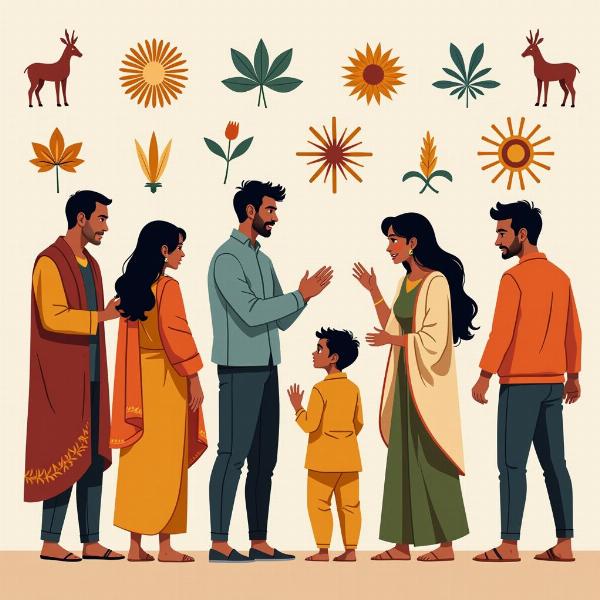The phrase “I heartily reciprocate the same” is a formal way of expressing mutual agreement or shared sentiment. When searching for its Hindi equivalent, you’re likely looking for a way to convey this sentiment respectfully and accurately in a Hindi-speaking context. This article explores various ways to express “I heartily reciprocate the same” in Hindi, considering the nuances of the situation and cultural context.
Expressing Reciprocity in Hindi: Beyond Literal Translation
Directly translating “I heartily reciprocate the same” into Hindi can sound stiff and unnatural. Instead of focusing on a literal translation, consider the underlying meaning: expressing agreement, returning a sentiment, or echoing a wish. This allows for more natural and culturally appropriate expressions.
- Main bhi aapki bhaavanaon se sehmat hun (मैं भी आपकी भावनाओं से सहमत हूँ): This translates to “I also agree with your sentiments.” It’s a polite and widely understood way to express agreement.
- Aapki shubhkamnaon ke liye dhanyavaad, main bhi aapke liye yahi chahta/chahti hun (आपकी शुभकामनाओं के लिए धन्यवाद, मैं भी आपके लिए यही चाहता/चाहती हूँ): This is suitable when responding to well wishes. It means “Thank you for your good wishes, I wish the same for you.” Use “chahta” if you are male and “chahti” if you are female.
- Bilkul, main bhi aisa hi sochta/sochti hun (बिल्कुल, मैं भी ऐसा ही सोचता/सोचती हूँ): This translates to “Absolutely, I think the same way.” It’s a more informal way to express agreement. Again, use “sochta” if you are male and “sochti” if you are female.
- Mai bhi yahi kahunga/kahungi (मैं भी यही कहूँगा/कहूँगी): This translates to “I would say the same.” It’s a simple and direct way to express agreement. Use “kahunga” if you are male and “kahungi” if you are female.
Choosing the Right Phrase: Context Matters
The best Hindi equivalent for “I heartily reciprocate the same” depends heavily on the context. Consider the following scenarios:
- Formal settings: In business or formal interactions, “Main bhi aapki bhaavanaon se sehmat hun” is a safe and respectful choice.
- Responding to greetings: When someone expresses good wishes, “Aapki shubhkamnaon ke liye dhanyavaad, main bhi aapke liye yahi chahta/chahti hun” is appropriate.
- Informal conversations: With friends and family, you can use more casual phrases like “Bilkul, main bhi aisa hi sochta/sochti hun” or “Mai bhi yahi kahunga/kahungi.”
Navigating Cultural Nuances
Indian culture values politeness and respect. Using appropriate honorifics like “ji” (जी) and “aap” (आप) is crucial when addressing elders or those in positions of authority. Even in informal settings, respectful language is generally preferred.
 Cultural Nuances in Indian Communication
Cultural Nuances in Indian Communication
Why Precision Matters in Translation
Accurate translation is crucial for effective communication. While “I heartily reciprocate the same” conveys a formal sentiment in English, a direct Hindi translation might not capture the same nuance. Choosing the right Hindi phrase ensures your message is understood correctly and respectfully.
Conclusion: Communicating with Clarity and Respect
Finding the appropriate Hindi equivalent for “I heartily reciprocate the same” involves understanding the context and cultural nuances. By choosing phrases that accurately reflect the underlying sentiment, you can communicate effectively and respectfully in Hindi. Remember to consider the formality of the situation and use appropriate honorifics.
FAQ
-
What is the most common way to say “I heartily reciprocate the same” in Hindi? Main bhi aapki bhaavanaon se sehmat hun is a common and respectful option.
-
How do I respond to someone’s well wishes in Hindi? Aapki shubhkamnaon ke liye dhanyavaad, main bhi aapke liye yahi chahta/chahti hun is a suitable response.
-
Is there an informal way to express agreement in Hindi? Bilkul, main bhi aisa hi sochta/sochti hun or Mai bhi yahi kahunga/kahungi are more informal options.
-
Why is it important to consider context when translating? The appropriate phrase depends on the situation and relationship between the speakers.
-
What are some important cultural considerations when speaking Hindi? Using respectful language and honorifics is crucial in Indian culture.
-
Can I use a direct translation of “I heartily reciprocate the same”? While possible, it might sound unnatural and not convey the intended meaning effectively.
-
Where can I learn more about Hindi language and culture? Meaning-Hindi.in offers a range of resources and translation services to help you navigate the nuances of Hindi.
About Meaning-Hindi.in
Meaning-Hindi.in is your trusted partner for accurate and culturally sensitive Hindi translations. We specialize in a wide range of translation services, from business and legal documents to website localization and educational materials. Our team of expert Hindi linguists ensures that your message is conveyed with precision and respect. Contact us today for all your Hindi translation needs. Email: [email protected], Phone: +91 11-4502-7584. Visit Meaning-Hindi.in for professional Hindi translation services.